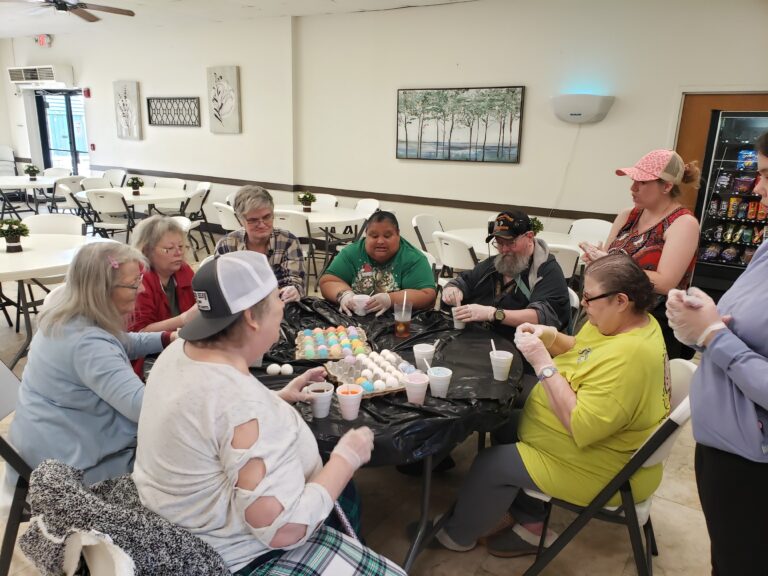Benefits of Residential Living for Mental Health Recovery
The benefits of residential living for mental health recovery, especially for individuals grappling with various mental health concerns, are numerous and transformative. By providing a structured environment with constant supervision, these facilities offer an ideal setting for individuals grappling with various mental health disorders.
Residential rehabilitation programs, with their state-operated services and focus on trauma therapies such as Eye Movement Desensitization and Reprocessing (EMDR), play a pivotal role in the journey toward recovery from mental health concerns. They serve as teaching tools, imparting essential life skills and fostering independence among residents. These settings also ensure professional intervention during crisis situations and employ health care strategies to support residents in their recovery.
Beyond this, specialized facilities provide educational opportunities that enhance coping mechanisms and strategies to handle different situations productively. The benefits of residential living for mental health recovery extend to physical wellness too; balanced meals contribute significantly to overall well-being, highlighting the interconnection between physical health and mental wellness.
Finally, nurturing healthy social relationships, which is crucial for individuals dealing with mental health concerns, is central to any individual’s journey toward recovery – another aspect that residential settings prioritize.
Table of Contents:
- The Role of Residential Rehabilitation Programs in Mental Health Recovery
- Constant Supervision and Care in Residential Facilities
- Educational Opportunities Within Specialized Facilities
- Emphasizing Physical Wellness in Mental Health Recovery
- Nurturing Healthy Social Relationships During the Recovery Process
- FAQs in Relation to Benefits of Residential Living for Mental Health Recovery
- Conclusion
The Role of Residential Rehabilitation Programs in Mental Health Recovery
Housing, including community-based supportive housing apartments, is crucial for mental health recovery, especially for those with unique cognitive disorders. State-operated services, like New York’s Office of Mental Health, provide over 46,000 community-based supportive housing apartments and resources tailored to diverse mental health needs. These services encompass a wide range of support, including access to health care services, to ensure holistic support for individuals on their path to recovery.
Crisis Residences: Teaching Life Skills with a Twist
In residential rehab programs, crisis residences serve as teaching tools where residents, including those with severe mental illness, learn essential life skills. From cooking and cleaning to managing finances and navigating public transportation, residents gain independence through hands-on experience.
Fostering Independence: State-Operated Services Leading the Way
State-operated services promote autonomy by offering personalized care plans. These plans include medication management and vocational training programs, equipping individuals with employable skills. The goal is successful reintegration into society post-recovery.
Independence boosts self-esteem and confidence, empowering individuals, including those with severe mental illness, to take charge of their lives despite cognitive challenges. This contributes to long-term recovery success rates.
Constant Supervision and Care in Residential Facilities
Residential facilities provide round-the-clock supervision and care for individuals with cognitive disorders, including those with severe mental illness. This means there’s always someone watching, like a reality TV show, but with more compassion. These facilities also offer support in developing and implementing coping strategies to manage symptoms and navigate daily challenges.
Importance of Professional Intervention During Crisis Situations
When it comes to managing crises, professional intervention, and coping strategies are crucial. It’s like having a superhero swoop in to save the day but without the cape and tights. Research has revealed that early action and effective coping strategies can dramatically reduce the intensity and length of psychological health issues, so it’s pretty important.
Trauma Therapies Such as Eye Movement Desensitization and Reprocessing (EMDR)
Residential facilities also offer specialized therapies for trauma recovery, like Eye Movement Desensitization and Reprocessing (EMDR). It’s like hitting the reset button on traumatic memories but without the need for a time machine. EMDR has been found effective in treating PTSD and other conditions, helping patients process their experiences and move toward complete mental health recovery.
But wait, there’s more. Residential facilities also incorporate other therapies like Cognitive Behavioral Therapy (CBT), Dialectical Behavior Therapy (DBT), and Mindfulness-Based Stress Reduction (MBSR). An array of treatments, specifically catered to each person’s requirements, is available for selection. These therapies equip residents with the tools necessary for managing emotions, reducing self-destructive behaviors, and enhancing social skills. It’s all about fostering resilience and promoting long-term recovery.
Living in a residential facility means having access to trained professionals who are always there to intervene promptly. It’s like having a squad of helpers available, primed to take on any struggles that arise. With specialized care, targeted therapies, and 24-hour supervision, these facilities are the ideal choice for individuals battling complex cognitive disorders.
Educational Opportunities Within Specialized Facilities
Residential treatment living isn’t just about comfort; it’s a chance to learn about your unique cognitive disorders and how to handle situations like a boss. By providing a structured and supportive environment, residential treatment offers individuals the opportunity to develop essential skills and coping strategies to navigate their cognitive challenges effectively.
Enhancing Coping Mechanisms Through Educational Programs
Living in specialized facilities, like Individual Care of Texas, means access to educational programs that boost the coping skills of people living in these facilities. These educational programs are specifically created to assist individuals in achieving success in managing their cognitive disorders and developing the necessary skills for their journey after their departure from the facility.
They provide instruction in mindfulness meditation, techniques for managing stress, and CBT to assist you in recognizing your ideas, identifying provocations, and responding with healthier behavior. So you can understand your thoughts, spot triggers, and respond in healthier ways.
Strategies For Handling Different Situations Productively
These facilities don’t just teach theory, they give you real-life scenarios to practice on, equipping you with the necessary skills to manage mental health symptoms effectively. From social interactions to unexpected changes, you’ll be ready to handle anything that comes your way.
By getting hands-on experience, you’ll build confidence and see your progress firsthand. It’s all about taking ownership of your growth and making lasting changes.
Emphasizing Physical Wellness in Mental Health Recovery
The journey towards mental health recovery is not just about the mind, but also about the body. Physical wellness, including regular exercise, proper nutrition, and sufficient sleep, is essential for sustaining good mental health and achieving long-term recovery from cognitive disorders and mental health symptoms.
Impact of Balanced Meals on Mental Well-Being
Eating balanced meals is important for physical wellness. Proper nutrition can have a profound effect on mental health. For example, foods rich in omega-3 fatty acids, like fish and walnuts, can help reduce depression symptoms. Berries containing antioxidants may help protect the brain from oxidative strain, which could be linked to unease and mental health issues.
Staying hydrated is also important for optimal brain function and mental well-being. Dehydration can lead to fatigue, confusion, and even anxiety – not good for cognitive disorders.
Interconnection Between Physical Health and Mental Wellness
Physical health and mental wellness are connected. Regular exercise stimulates brain chemicals that make you feel happier and more relaxed – great for cognitive disorders.
Exercise also boosts self-confidence by improving appearance, which enhances self-esteem – important for long-term recovery from cognitive challenges.
- Mindful Movement: Activities like yoga or tai chi create awareness of bodily sensations, helpful for managing trauma-related conditions.
- Aerobic Exercise: Regular aerobic exercise, like jogging or swimming, reduces symptoms of depression by increasing serotonin levels in the brain.
- Nature Walks: Walking in nature provides moderate-intensity exercise and therapeutic benefits from being outdoors.
To sum up: prioritizing physical wellness is crucial for a successful recovery from cognitive challenges. Providers should emphasize nurturing both mind and body throughout the treatment plan for each individual resident.
Nurturing Healthy Social Relationships During the Recovery Process
Recovering from cognitive disorders is tough, but it’s easier with medical help and emotional support. That’s where residential living facilities like Hanley Center come in, providing a supportive environment where individuals can receive the necessary medical assistance, and emotional support, and learn essential skills to live independently.
The Role of Social Relationships in Recovery
Social connections are crucial for long-term recovery. Social connections offer a sense of being part of something and understanding, generating an atmosphere for recuperation and development. At Hanley Center, they prioritize nurturing these healthy relationships among residents and their loved ones.
Research shows that social support reduces depression and anxiety, boosts self-esteem, and increases optimism about the future (source). Strong social networks also help us cope better during stressful times (source).
Fostering a Sense of Belonging
Feeling at home is crucial in the recovery process. Residents should feel safe, comfortable, and understood, as it fosters a sense of belonging and promotes healing. This involves providing group activities to foster connection, private spaces for personal reflection, and open communication with staff members who are always ready to listen, offer guidance, and support residents in their journey toward recovery and the goal of live independently.
Promoting Understanding Among Residents
Education about cognitive disorders is key to fostering understanding among people living in residential facilities. By gaining insight into each other’s struggles, residents become more empathetic and supportive of one another. This knowledge creates stronger bonds and healthier relationships, aiding in the rehabilitation process and creating a supportive community.
Cultivating Empathy: A Key to Successful Recovery
Cultivating empathy is essential for long-term recovery. When we understand someone else’s feelings and perspectives, we can respond compassionately. Empathy allows us to connect on a deeper level and support each other beyond surface interactions. It’s incredibly beneficial for anyone seeking to regain control of their life after treatment ends.
FAQs in Relation to Benefits of Residential Living for Mental Health Recovery
Where is the best place to live for mental health?
The best place to live for individuals with unique cognitive challenges would be in a residential rehabilitation program like Individual Care of Texas, which provides specialized care and support.
How does family help in mental health recovery?
A supportive family can provide emotional stability, empathy, and understanding which are crucial components in an individual’s journey towards mental health recovery.
How is mental health affected by housing?
Housing plays a significant role in one’s mental well-being. Stable, safe, and comfortable living conditions such as those provided at residential facilities can significantly improve an individual’s mental wellness.
Why is mental health important for the homeless?
Mental Health is vital for everyone, including the homeless population, as it affects their ability to find stable housing and maintain relationships. Organizations like the National Alliance on Mental Illness (NAMI) offer resources to assist this vulnerable group.
“`
Conclusion
In conclusion, residential living, with its constant supervision and professional intervention, is like a mental health superhero, swooping in with benefits galore. Benefits of Residential Living for Mental Health Recovery include crisis residences and state-operated services, which serve as sidekicks, teaching life skills and fostering independence. With constant supervision and professional intervention, they’re always there to save the day during crisis situations.
And let’s not forget about trauma therapies like EMDR, the secret weapon in the battle for recovery. But wait, there’s more! Specialized facilities offer educational opportunities to boost coping mechanisms and teach strategies for handling any situation like a boss. They also know that physical wellness is the sidekick to mental well-being, serving up balanced meals to keep you feeling super.
And last but not least, they understand the power of healthy social relationships, because even superheroes need a support system. Whether it’s through group therapy sessions, shared activities, or community engagement, residents in a residence for mentally ill individuals find comfort and strength in building connections with their peers and staff members.






